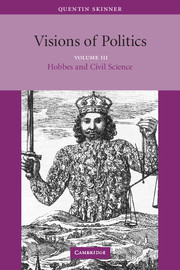Book contents
- Frontmatter
- Contents
- General preface
- Full contents: Volumes 1–3
- Acknowledgements
- Conventions
- 1 Introduction: Hobbes's life in philosophy
- 2 Hobbes and the studia humanitatis
- 3 Hobbes's changing conception of civil science
- 4 Hobbes on rhetoric and the construction of morality
- 5 Hobbes and the classical theory of laughter
- 6 Hobbes and the purely artificial person of the state
- 7 Hobbes on the proper signification of liberty
- 8 History and ideology in the English revolution
- 9 The context of Hobbes's theory of political obligation
- 10 Conquest and consent: Hobbes and the engagement controversy
- 11 Hobbes and his disciples in France and England
- 12 Hobbes and the politics of the early Royal Society
- Bibliographies
- Index
11 - Hobbes and his disciples in France and England
Published online by Cambridge University Press: 05 September 2012
- Frontmatter
- Contents
- General preface
- Full contents: Volumes 1–3
- Acknowledgements
- Conventions
- 1 Introduction: Hobbes's life in philosophy
- 2 Hobbes and the studia humanitatis
- 3 Hobbes's changing conception of civil science
- 4 Hobbes on rhetoric and the construction of morality
- 5 Hobbes and the classical theory of laughter
- 6 Hobbes and the purely artificial person of the state
- 7 Hobbes on the proper signification of liberty
- 8 History and ideology in the English revolution
- 9 The context of Hobbes's theory of political obligation
- 10 Conquest and consent: Hobbes and the engagement controversy
- 11 Hobbes and his disciples in France and England
- 12 Hobbes and the politics of the early Royal Society
- Bibliographies
- Index
Summary
When Hobbes arrived in France at the end of 1640, ‘the first of all that fled’ from the growing threat of civil war in England, he began an exile that was to last eleven years, an exile that was also to prove the most intellectually fruitful period of his long life. In Paris he reached the height of his polemical powers, conducting his debates with Descartes about the existence of secondary qualities and with Bishop Bramhall about the freedom of the will. At the same time he brought to fruition a lifetime of speculation about the science of politics, completing De Cive and writing the whole of Leviathan. He also became active in what he described as a ‘good company’ of scientists and philosophers gathered round the figure of Marin Mersenne, and spent much of his time in mathematical speculation and the conduct of optical research.
It may not have been pure chance that Hobbes in exile reached the zenith of his creative powers. For it is an ironic but revealing fact about his biography that in Paris he found exactly the kind of congenial intellectual company that he always lacked at home. On his return to England in 1651 he became an isolated figure. He was isolated for much of the time in the remote wilds of Derbyshire, where ‘the want of learned Conversation’, as he confessed to John Aubrey ‘was a great inconvenience’.
- Type
- Chapter
- Information
- Visions of Politics , pp. 308 - 323Publisher: Cambridge University PressPrint publication year: 2002



